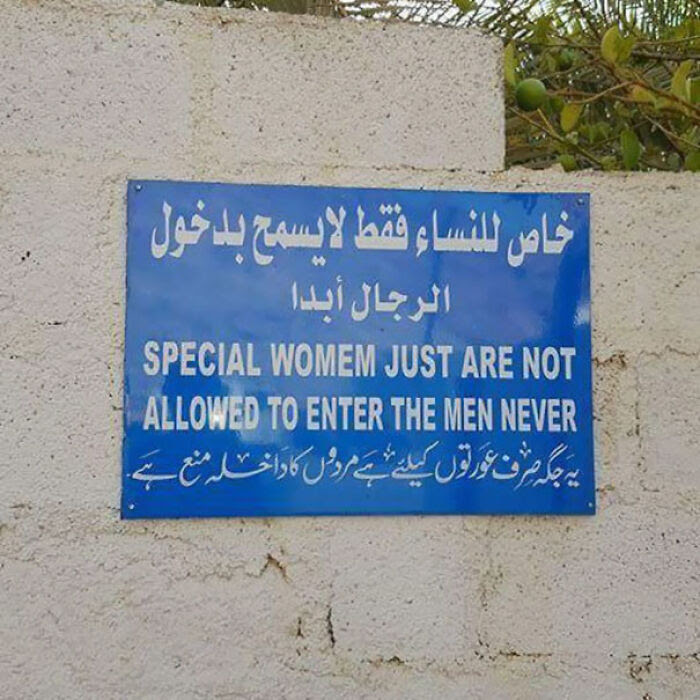Special womem
« previous post | next post »
The English is a mess, but the Arabic (top) and Urdu (bottom) make sense:
Arabic:
Khaas lanisa faqt la yasmah bad badqwal al rijal abda.
Alternative transliteration:
Khass lil-nisa’ faqat la-yasmah bi-dukhul al-rijal abadan.
"Special for women only. Not allowed to enter for men." ( or men can never enter)
Alternative translation:
“Private, for Women Only: Entry by Men is Never Permitted.”
Urdu:
Yeh haha silat auwraton key lieyeh hai. Mardi ko dakhtan manah hai.
"This space is only for women. It is forbidden for men to enter."
You can guess why: see here and here for a sample of reasons why.
Selected readings
- "Gentle reminder for women who approach the cenotaph of Genghis Khan" (8/4/22)
- "Diglossia and digraphia in Guoyu-Putonghua and in Hindi-Urdu" (1/1/12)
- "Is the Urdu script on the verge of dying?" (6/29/14)
[Thanks to Daud Ali, Heather Sharkey, and John Mullan]

AntC said,
January 19, 2023 @ 9:52 am
The English is a mess,
Indeed. From the English alone, I'm left wondering whether the sign is excluding Women in general or excluding some specific category of Women, or excluding Men, or even all of the above.
reasons why
All of the religions of Abraham have gender-specific segregations. (In my youth, women were expected to cover their heads in CofE and Catholic churches; whereas men were to be bare-headed.)
yandoodan said,
January 19, 2023 @ 10:53 am
AntC said:
(In my youth, women were expected to cover their heads in CofE and Catholic churches; whereas men were to be bare-headed.)
I think this was a fashion thing instead of a religion thing. Up through the 1950s, every adult wore a hat outdoors. Men were expected to remove their hats as soon as they entered a building, but women couldn't; they had stuck their hats to their hair with hatpins. This disappeared as hat-wearing faded from fashion.
Up through the mid-nineteenth century some rural fundamentalist churches segregated women from men, even using separate doors. You can occasionally see it in very old churches, but being wood frame they seldom survive.
Scott P. said,
January 19, 2023 @ 12:07 pm
I think this was a fashion thing instead of a religion thing.
Definitely a religious thing. 1 Cor 11:4-5:
"Every man who prays or prophesies with his head covered dishonors his head. But every woman who prays or prophesies with her head uncovered dishonors her head—it is the same as having her head shaved."
Rick said,
January 19, 2023 @ 1:08 pm
My mother went to a Catholic school in the 1950s. If any girl forgot her hat for daily mass, the nuns would make them wear a napkin on their heads in its place!
Neil said,
January 19, 2023 @ 6:10 pm
I read the Urdu as "yeh jagah sirf"…then later on it’s "mardon ko daaxila"
David Morris said,
January 19, 2023 @ 7:55 pm
The best I can make of the English is that it allows non-special women to enter, (which raises the question of which women are special and which aren't).
Terry K. said,
January 19, 2023 @ 8:20 pm
It's interesting to me to notice that the English would make a whole lot more sense if it added either punctuation or a line break at the right spot. "Special, women just. Are not allowed to enter men never". Still a mess, but one that has a chance of being understood.
Victor Mair said,
January 19, 2023 @ 9:30 pm
@Terry K.
And add a comma after "enter". (?)
Kate Bunting said,
January 20, 2023 @ 11:40 am
My mother was brought up Methodist, but I remember her saying that, when she was a girl in the 1920s, if she and her sister went into an Anglican church as sightseers they would be told to cover their heads, and would wear a handkerchief! No longer the case in our (fairly 'low church') parish church in the 1950s/60s.
Dan Levine said,
January 21, 2023 @ 12:34 am
For orthodox Jews it's the opposite: men are supposed to cover their heads in synagogue (with a yarmulke or kipa) but not women. The reason given is blatantly sexist: the head covering for men is to symbolize that God is "above" them, but women already have men "above" them so don't need the covering. Reform and some conservative Jews have dropped that requirement in favor of gender equality.
Lameen said,
January 29, 2023 @ 10:16 am
Of the two Arabic transliterations, the second is acceptable if imprecise, the first is a mess that could only have been made by someone with no knowledge of Arabic.